- Home
- Stanley G. Weinbaum
The Ideal
The Ideal Read online
The Ideal
Stanley G. Weinbaum
The Ideal
by Stanley Grauman Weinbaum
"This," said the Franciscan, "is my Automaton, who at the proper time will speak, answer whatsoever question I may ask, and reveal all secret knowledge to me." He smiled as he laid his hand affectionately on the iron skull that topped the pedestal.
The youth gazed open-mouthed, first at the head and then at the Friar. "But it's iron!" he whispered. "The head is iron, good father."
"Iron without, skill within, my son," said Roger Bacon. "It will speak, at the proper time and in its own manner, for so have I made it. A clever man can twist the devil's arts to God's ends, thereby cheating the fiend — Sst! There sounds vespers! Plena gratia, ave Virgo — "
But it did not speak. Long hours, long weeks, the doctor mirabilis watched his creation, but iron lips were silent and the iron eyes dull, and no voice but the great man's own sounded in his monkish cell, nor was there ever an answer to all the questions that he asked — until one day when he sat surveying his work, composing a letter to Duns Scotus in distant Cologne — one day —
"Time is!" said the image, and smiled benignly.
The Friar looked up. "Time is, indeed," he echoed. "Time it is that you give utterance, and to some assertion less obvious than that time is. For of course time is, else there were nothing at all. Without time — "
"Time was!" rumbled the image, still smiling, but sternly at the statue of Draco.
"Indeed time was," said the Monk. "Time was, is, and will be, for time is that medium in which events occur. Matter exists in space, but events — "
The image smiled no longer. "Time is past!" it roared in tones deep as the cathedral bell outside, and burst into ten thousand pieces.
* * * * *
"There," said old Haskel van Manderpootz, shutting the book, "is my classical authority in this experiment. This story, overlaid as it is with mediæval myth and legend, proves that Roger Bacon himself attempted the experiment — and failed." He shook a long finger at me. "Yet do not get the impression, Dixon, that Friar Bacon was not a great man. He was — extremely great, in fact; he lighted the torch that his namesake Francis Bacon took up four centuries later, and that now van Manderpootz rekindles."
I stared in silence.
"Indeed," resumed the Professor, "Roger Bacon might almost be called a thirteenth century van Manderpootz, or van Manderpootz a twenty-first century Roger Bacon. His Opus Majus, Opus Minus, and Opus Tertium — "
"What," I interrupted impatiently, "has all this to do with — that?" I indicated the clumsy metal robot standing in the corner of the laboratory.
"Don't interrupt!" snapped van Manderpootz. "I'll — "
At this point I fell out of my chair. The mass of metal had ejaculated something like "A-a-gh-rasp" and had lunged a single pace toward the window, arms upraised. "What the devil!" I sputtered as the thing dropped its arms and returned stolidly to its place.
"A car must have passed in the alley," said van Manderpootz indifferently. "Now as I was saying, Roger Bacon — "
I ceased to listen. When van Manderpootz is determined to finish a statement, interruptions are worse than futile. As an ex-student of his, I know. So I permitted my thoughts to drift to certain personal problems of my own, particularly Tips Alva, who was the most pressing problem of the moment. Yes, I mean Tips Alva the 'vision dancer, the little blonde imp who entertains on the Yerba Mate hour for that Brazilian company. Chorus girls, dancers, and television stars are a weakness of mine; maybe it indicates that there's a latent artistic soul in me. Maybe.
I'm Dixon Wells, you know, scion of the N. J. Wells Corporation, Engineers Extraordinary. I'm supposed to be an engineer myself; I say supposed, because in the seven years since my graduation, my father hasn't given me much opportunity to prove it. He has a strong sense of value of time, and I'm cursed with the unenviable quality of being late to anything and for everything. He even asserts that the occasional designs I submit are late Jacobean, but that isn't fair. They're Post-Romanesque.
Old N. J. also objects to my penchant for ladies of the stage and 'vision screen, and periodically threatens to cut my allowance, though that's supposed to be a salary. It's inconvenient to be so dependent, and sometimes I regret that unfortunate market crash of 2009 that wiped out my own money, although it did keep me from marrying Whimsy White, and van Manderpootz, through his subjunctivisor, succeeded in proving that that would have been a catastrophe. But it turned out nearly as much of a disaster anyway, as far as my feelings were concerned. It took me months to forget Joanna Caldwell and her silvery eyes. Just another instance when I was a little late.
Van Manderpootz himself is my old Physics Professor, head of the Department of Newer Physics at N. Y. U., and a genius, but a bit eccentric. Judge for yourself.
"And that's the thesis," he said suddenly, interrupting my thoughts.
"Eh? Oh, of course. But what's that grinning robot got to do with it?"
He purpled. "I've just told you!" he roared. "Idiot! Imbecile! To dream while van Manderpootz talks! Get out! Get out!"
I got. It was late anyway, so late that I overslept more than usual in the morning, and suffered more than the usual lecture on promptness from my father at the office.
* * * * *
Van Manderpootz had forgotten his anger by the next time I dropped in for an evening. The robot still stood in the corner near the window, and I lost no time asking its purpose.
"It's just a toy I had some of the students construct," he explained. "There's a screen of photoelectric cells behind the right eye, so connected that when a certain pattern is thrown on them, it activates the mechanism. The thing's plugged into the light-circuit, but it really ought to run on gasoline."
"Why?"
"Well, the pattern it's set for is the shape of an automobile. See here." He picked up a card from his desk, and cut in the outlines of a streamlined car like those of that year. "Since only one eye is used," he continued, "The thing can't tell the difference between a full-sized vehicle at a distance and this small outline nearby. It has no sense of perspective."
He held the bit of cardboard before the eye of the mechanism. Instantly came its roar of "A-a-gh-rasp!" and it leaped forward a single pace, arms upraised. Van Manderpootz withdrew the card, and again the thing relapsed stolidly into its place.
"What the devil!" I exclaimed. "What's it for?"
"Does van Manderpootz ever do work without reason back of it? I use it as a demonstration in my seminar."
"To demonstrate what?"
"The power of reason," said van Manderpootz solemnly.
"How? And why ought it to work on gasoline instead of electric power?"
"One question at a time, Dixon. You have missed the grandeur of van Manderpootz's concept. See here, this creature, imperfect as it is, represents the predatory machine. It is the mechanical parallel of the tiger, lurking in its jungle to leap on living prey. This monster's jungle is the city; its prey is the unwary machine that follows the trails called streets. Understand?"
"No."
"Well, picture this automaton, not as it is, but as van Manderpootz could make it if he wished. It lurks gigantic in the shadows of buildings; it creeps stealthily through dark alleys; it skulks on deserted streets, with its gasoline engine purring quietly. Then — an unsuspecting automobile flashes its image on the screen behind its eyes. It leaps. It seizes its prey, swinging it in steel arms to its steel jaws. Through the metal throat of its victim crash steel teeth; the blood of its prey — the gasoline, that is — is drained into its stomach, or its gas-tank. With renewed strength it flings away the husk and prowls on to seek other prey. It is the machine-carnivore, the tiger of mechanics."
I s
uppose I stared dumbly. It occurred to me suddenly that the brain of the great van Manderpootz was cracking. "What the — ?" I gasped.
"That," he said blandly, "is but a concept. I have many another use for the toy. I can prove anything with it, anything I wish."
"You can? Then prove something."
"Name your proposition, Dixon."
I hesitated, nonplussed.
"Come!" he said impatiently. "Look here; I will prove that anarchy is the ideal government, or that Heaven and Hell are the same place, or that — "
"Prove that!" I said. "About Heaven and Hell."
"Easily. First we will endow my robot with intelligence. I add a mechanical memory by means of the old Cushman delayed valve; I add a mathematical sense with any of the calculating machines; I give it a voice and a vocabulary with the magnetic-impulse wire phonograph. Now the point I make is this: Granted an intelligent machine, does it not follow that every other machine constructed like it must have the identical qualities? Would not each robot given the same insides have exactly the same character?"
"No!" I snapped. "Human beings can't make two machines exactly alike. There'd be tiny differences; one would react quicker than others, or one would prefer Fox Airsplitters as prey, while another reacted most vigorously to Carnecars. In other words, they'd have — individuality!" I grinned in triumph.
"My point exactly," observed van Manderpootz. "You admit, then, that this individuality is the result of imperfect workmanship. If our means of manufacture were perfect, all robots would be identical, and this individuality would not exist. Is that true?"
"I — suppose so."
"Then I argue that our own individuality is due to our falling short of perfection. All of us — even van Manderpootz — are individuals only because we are not perfect. Were we perfect, each of us would be exactly like everyone else. True?"
"Uh — yes."
"But Heaven, by definition, is a place where all is perfect. Therefore, in Heaven everybody is exactly like everybody else, and therefore, everybody is thoroughly and completely bored! There is no torture like boredom, Dixon, and — Well, have I proved my point?"
I was floored. "But — about anarchy, then?" I stammered.
"Simple. Very simple for van Manderpootz. See here; with a perfect nation — that is, one whose individuals are all exactly alike, which I have just proved to constitute perfection — with a perfect nation, I repeat, laws and government are utterly superfluous. If everybody reacts to stimuli in the same way, laws are quite useless, obviously. If, for instance, a certain event occurred that might lead to a declaration of war, why, everybody in such a nation would vote for war at the same instant. Therefore government is unnecessary, and therefore anarchy is the ideal government, since it is the proper government for a perfect race." He paused. "I shall now prove that anarchy is not the ideal government — "
"Never mind!" I begged. "Who am I to argue with van Manderpootz? But is that the whole purpose of this dizzy robot? Just a basis for logic?" The mechanism replied with its usual rasp as it leaped toward some vagrant car beyond the window.
"Isn't that enough?" growled van Manderpootz. "However," — his voice dropped — "I have even a greater destiny in mind. My boy, van Manderpootz has solved the riddle of the universe!" He paused impressively. "Well, why don't you say something?"
"Uh!" I gasped. "It's — uh — marvelous!"
"Not for van Manderpootz," he said modestly.
"But — what is it?"
"Eh — Oh!" He frowned. "Well, I'll tell you, Dixon. You won't understand, but I'll tell you." He coughed. "As far back as the early twentieth century," he resumed, "Einstein proved that energy is particular. Matter is also particular, and now van Manderpootz adds that space and time are discrete!" He glared at me.
"Energy and matter are particular," I murmured, "and space and time are discrete! How very moral of them!"
"Imbecile!" he blazed. "To pun on the words of van Manderpootz! You know very well that I mean particular and discrete in the physical sense. Matter is composed of particles, therefore it is particular. The particles of matter are called electrons, protons, and neutrons, and those of energy, quanta. I now add two others, the particles of space I call spations, those of time, chronons."
"And what in the devil," I asked, "are particles of space and time?"
"Just what I said!" snapped van Manderpootz. "Exactly as the particles of matter are the smallest pieces of matter that can exist, just as there is no such thing as a half of an electron, or for that matter, half a quantum, so the chronon is the smallest possible fragment of time, and the spation the smallest possible bit of space. Neither time nor space is continuous; each is composed of these infinitely tiny fragments."
"Well, how long is a chronon in time? How big is a spation in space?"
"Van Manderpootz has even measured that. A chronon is the length of time it takes one quantum of energy to push one electron from one electronic orbit to the next. There can obviously be no shorter interval of time, since an electron is the smallest unit of matter and the quantum the smallest unit of energy. And a spation is the exact volume of a proton. Since nothing smaller exists, that is obviously the smallest unit of space."
"Well, look here," I argued. "Then what's in between these particles of space and time? If time moves, as you say, in jerks of one chronon each, what's between the jerks?"
"Ah!" said the great van Manderpootz. "Now we come to the heart of the matter. In between the particles of space and time, must obviously be something that is neither space, time, matter, nor energy. A hundred years ago Shapley anticipated van Manderpootz in a vague way when he announced his cosmo-plasma, the great underlying matrix in which time and space and the universe are embedded. Now van Manderpootz announces the ultimate unit, the universal particle, the focus in which matter, energy, time, and space meet, the unit from which electrons, protons, neutrons, quanta, spations, and chronons are all constructed. The riddle of the universe is solved by what I have chosen to name the cosmon." His blue eyes bored into me.
"Magnificent!" I said feebly, knowing that some such word was expected. "But what good is it?"
"What good is it?" he roared. "It provides — or will provide, once I work out a few details — the means of turning energy into time, or space into matter, or time into space, or — " He sputtered into silence. "Fool!" he muttered. "To think that you studied under the tutelage of van Manderpootz. I blush; I actually blush!"
One couldn't have told it if he were blushing. His face was always rubicund enough. "Colossal!" I said hastily. "What a mind!"
That mollified him. "But that's not all," he proceeded. "Van Manderpootz never stops short of perfection. I now announce the unit particle of thought — the psychon!"
This was a little too much. I simply stared.
"Well may you be dumbfounded," said van Manderpootz. "I presume you are aware, by hearsay at least, of the existence of thought. The psychon, the unit of thought, is one electron plus one proton, which are bound so as to form one neutron, embedded in one cosmon, occupying a volume of one spation, driven by one quantum for a period of one chronon. Very obvious; very simple."
"Oh, very!" I echoed. "Even I can see that that equals one psychon."
He beamed. "Excellent! Excellent!"
"And what," I asked, "will you do with the psychons?"
"Ah," he rumbled. "Now we go even past the heart of the matter, and return to Isaak here." He jammed a thumb toward the robot. "Here I will create Roger Bacon's mechanical head. In the skull of this clumsy creature will rest such intelligence as not even van Manderpootz — I should say, as only van Manderpootz — can conceive. It remains merely to construct my idealizator."
"Your idealizator?"
"Of course. Have I not just proven that thoughts are as real as matter, energy, time, or space? Have I not just demonstrated that one can be transformed, through the cosmon, into any other? My idealizator is the means of transforming psychons to quanta, just as, for
instance, a Crookes tube or X-ray tube transforms matter to electrons. I will make your thoughts visible! And not your thoughts as they are in that numb brain of yours, but in ideal form. Do you see? The psychons of your mind are the same as those from any other mind, just as all electrons are identical, whether from gold or iron. Yes! Your psychons" — his voice quavered — "are identical with those from the mind of — van Manderpootz!" He paused, shaken.
"Actually?" I gasped.
"Actually. Fewer in number, of course, but identical. Therefore, my idealizator shows your thought released from the impress of your personality. It shows it — ideal!"
Well, I was late to the office again.
* * * * *
A week later I thought of van Manderpootz. Tips was on tour somewhere, and I didn't dare take anyone else out because I'd tried it once before and she'd heard about it. So, with nothing to do, I finally dropped around to the professor's quarter, found him missing, and eventually located him in his laboratory at the Physics Building. He was puttering around the table that had once held that damned subjunctivisor of his, but now it supported an indescribable mess of tubes and tangled wires, and as its most striking feature, a circular plane mirror etched with a grating of delicately scratched lines.
"Good evening, Dixon," he rumbled.
I echoed his greeting. "What's that?" I asked.
"My idealizator. A rough model, much too clumsy to fit into Isaak's iron skull. I'm just finishing it to try it out." He turned glittering blue eyes on me. "How fortunate that you're here. It will save the world a terrible risk."
"A risk?"
"Yes. It is obvious that too long an exposure to the device will extract too many psychons, and leave the subject's mind in a sort of moronic condition. I was about to accept the risk, but I see now that it would be woefully unfair to the world to endanger the mind of van Manderpootz. But you are at hand, and will do very well."
"Oh, no I won't!"
"Come, come!" he said, frowning. "The danger is negligible. In fact, I doubt whether the device will be able to extract any psychons from your mind. At any rate, you will be perfectly safe for a period of at least half an hour. I, with a vastly more productive mind, could doubtless stand the strain indefinitely, but my responsibility to the world is too great to chance it until I have tested the machine on someone else. You should be proud of the honor."

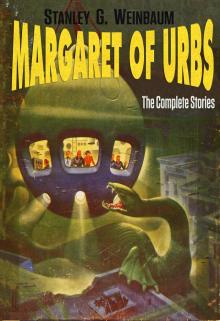 The Complete Margaret of Urbs
The Complete Margaret of Urbs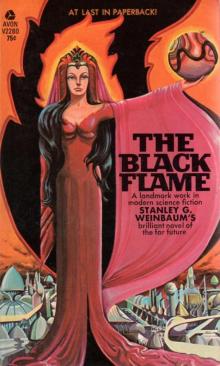 The Black Flame
The Black Flame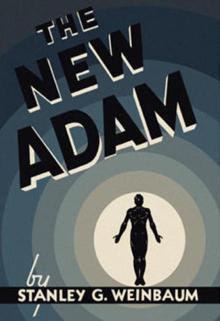 The New Adam
The New Adam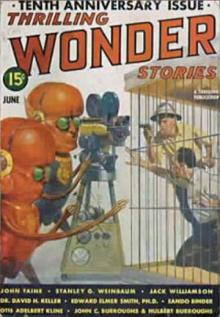 Dawn of Flame
Dawn of Flame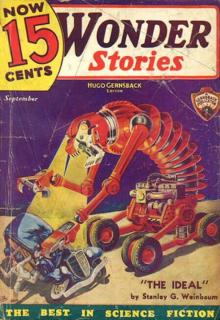 The Ideal
The Ideal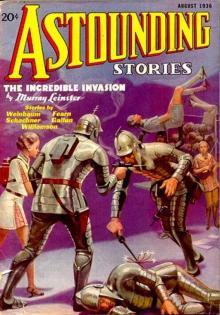 Proteus Island
Proteus Island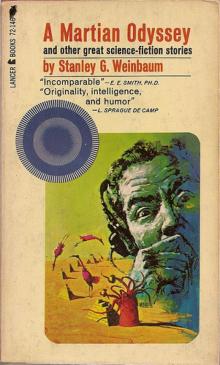 The Worlds of If
The Worlds of If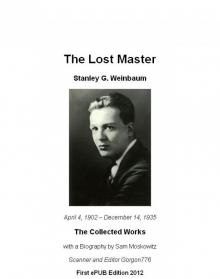 The Lost Master - The Collected Works
The Lost Master - The Collected Works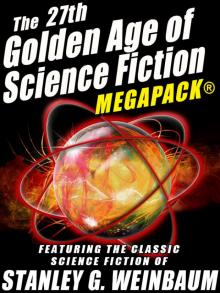 The 27th Golden Age of Science Fiction
The 27th Golden Age of Science Fiction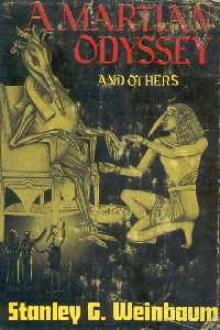 A Martian Odyssey
A Martian Odyssey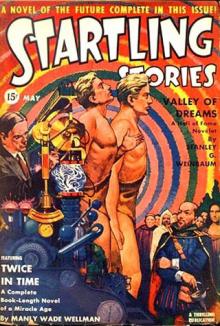 Valley of Dreams
Valley of Dreams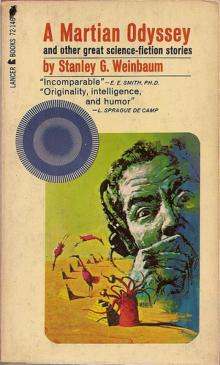 The Point of View
The Point of View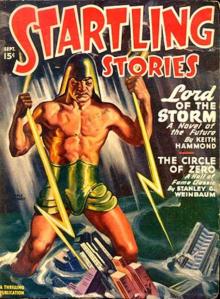 The Circle of Zero
The Circle of Zero